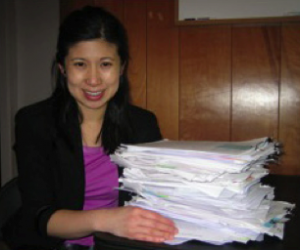Preparation Is The Key To The Kingdom
When I first started to take an interest in learning to present in public, I attended a speaking conference and saw some amazing, confident and funny speakers present on stage.
After the conference, I went up to one of the presenters and said, “You make presenting look so easy and effortless. Tell me, do you ever get nervous?”

This is the pile of feedback sheets that I collected from my test audiences throughout my World Championship speech preparation process.
And do you know what his response was?
“Mary, I only get nervous if I’m not prepared.”
That was a light-bulb moment for me. Oh! So how nervous you feel is directly proportional to how well you prepared for your presentation!
Translation: The more prepared you are, the more confident you will feel.
Since then, I’ve learned that preparation is a process. Here are some tips on how to prepare for your big speech.
1) The Early Bird Gets the Worm
Begin your preparation as early as possible so you have the luxury of time on your side.
2) To Be Your Best, You Must Test
Most people rehearse a presentation on their own. While this is a must, I recommend rehearsing with a test audience as well. Ask people you know such as family, friends or co-workers to watch you give your presentation and give you feedback. Your local Toastmasters club also makes a great test audience (www.toastmasters.org).
It helps to ask your test audience specific questions such as “Were there any parts of the presentation that were confusing to you?”, “Was the opening and closing powerful enough?”, “What did you learn from it?. You can even prepare feedback sheets for your test audience to fill out, like I did for my World Championship speech.
3) R and R
R and R stands for Record and Refine. During a rehearsal with your test audience, record yourself. Audio recording is good but video is even better. Watch the tape of yourself giving the presentation. It may be difficult to watch yourself at first. This is normal. We are all self-critical, so be kind!
Look for little habits you might have such as pacing around too much, playing with your own hands, saying too many um’s or ah’s. The good news is that knowing is half the battle. Once you are aware of these habits, you can work on eliminating them in your next rehearsal.
Refine your presentation based on the feedback your test audience gave you and your own assessments of your rehearsal recording.
Preparation is a process – Repeat steps 2 and 3 until you are comfortable and confident with both your content and delivery.
Remember, the more prepared you are, the more refined your presentation will be and the more confident you will feel.
How prepared will you be for your next presentation?
Mary Cheyne
2009 World Champion of Public Speaking 1st Runner Up
Keynote Speaker/Trainer/Coach
Magnetic Podium
